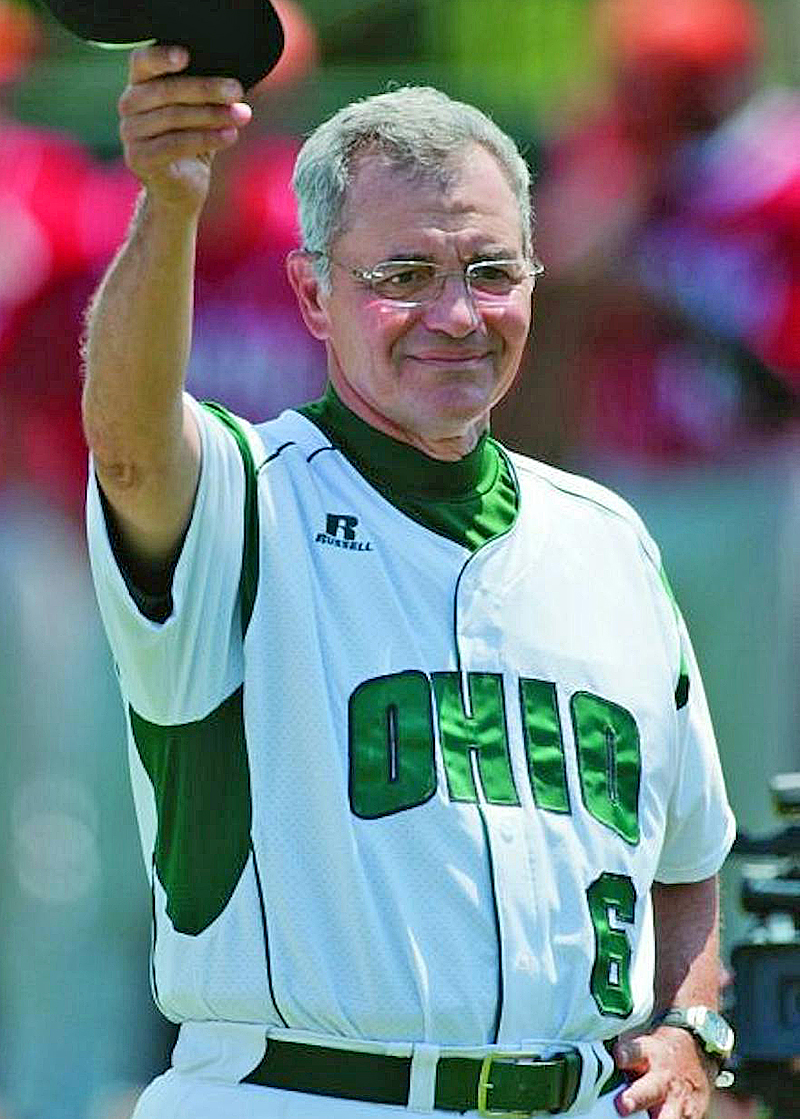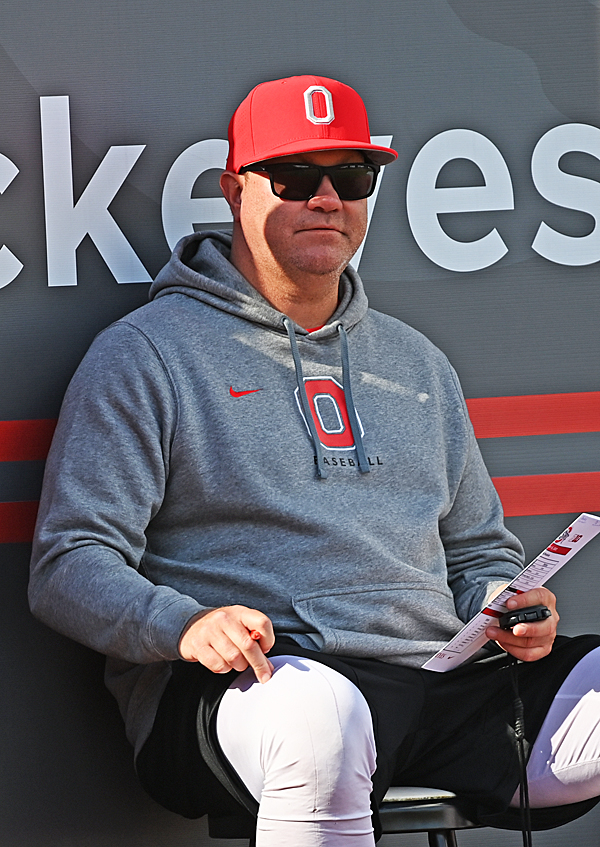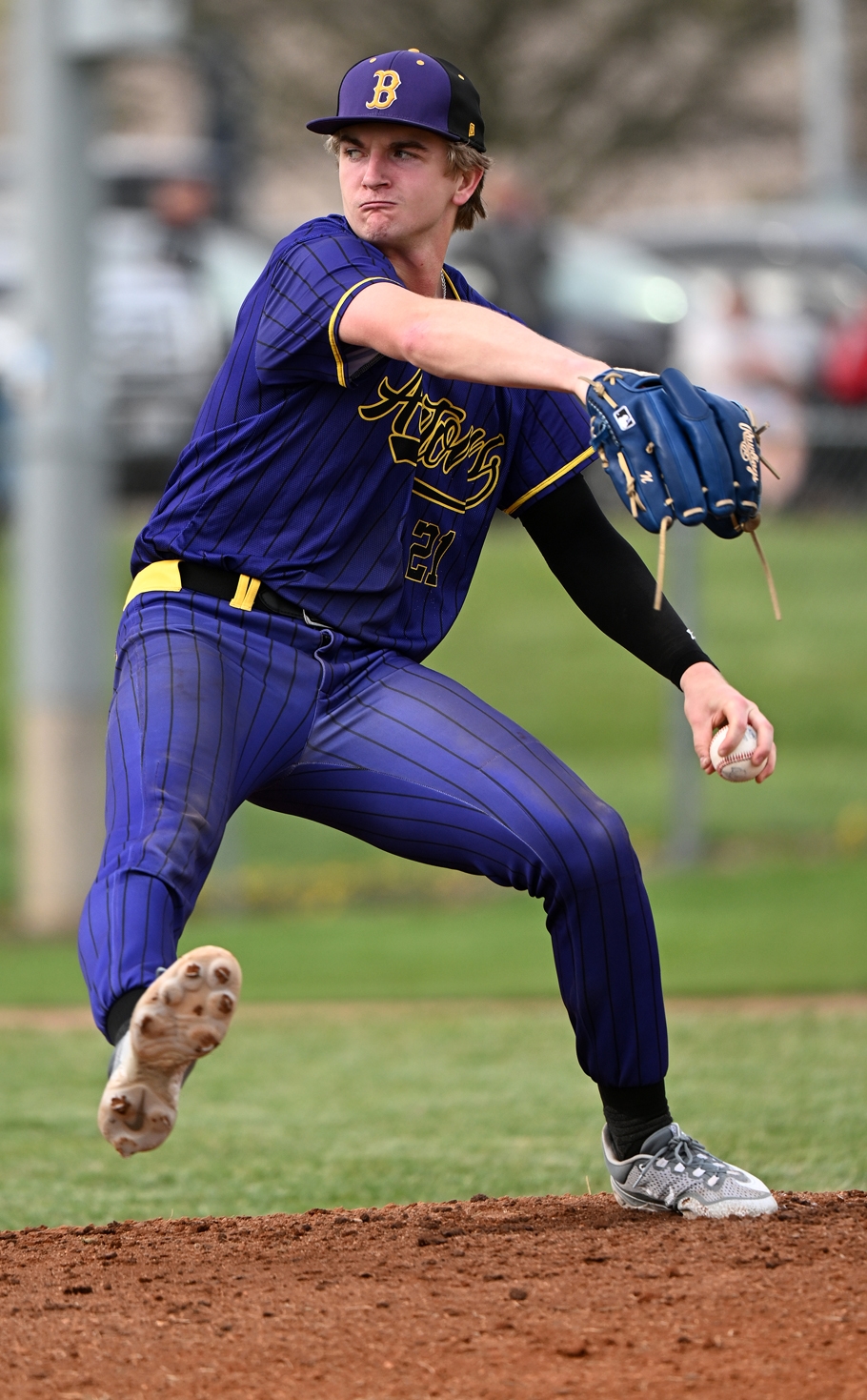
He won 689 games as head coach at Ohio University…and baseball savant Joe Carbone is still out there looking for amateur talent. (Photo courtesy of Ohio University)
If you want to play college baseball, and you’re committed to play for that school that recruited you because they believed you could make a difference…be sure of your game before you get there, and be ready to learn.
 Social media is full of lists this summer of player rankings for Ohio high school baseball talent…college commitments for next year (’26), and the best prospects to commit in 2027.
Social media is full of lists this summer of player rankings for Ohio high school baseball talent…college commitments for next year (’26), and the best prospects to commit in 2027.
But, what does that mean…if you’re on one of those lists?
Does it mean what you hope it means?
How do you make sure?
And what’s it mean…if you’re not on someone’s list?

Publisher Sonny Fulks writes OHSAA sports and Ohio State baseball for Press Pros Magazine.
A friend from Huntington sent me the Prep Baseball Report list this week of top high school baseball prospects in Ohio (including a pair of pitchers committed to Ohio State), asking if Press Pros was familiar with names like Hunter Richardson (Vandalia Butler), Connor Cuozzo (Moeller HS), Chandler Taylor (Hamilton Badin), and Keaton Bowers (Hilliard Bradley).
And we are familiar, as our paths cross throughout the regular season and in the district, regional and state tournament rounds of the OHSAA tournament.
“I’m curious,” he went on to ask: “Of the names on the list, how many will be impact players in college baseball?”
I answered that it depends, of course, on which level of college baseball.
If you mean Ohio State, or Tennessee, or Louisville…perhaps as many as a half dozen, if you’re not in a hurry for impact.
If you’re in a hurry…I’m guessing two or three out of twenty five, depending on what you mean by ‘impact’.

Logan Services, in Dayton, Cincinnati, and Columbus proudly sponsors your favorite sports on Press Pros Magazine.com.
Being from Huntington, he said, “I don’t see any names committed to Marshall,” where coach Greg Beals enters his fourth season as coach of the Thundering Herd this September.
And that could be, depending on the needs at Marshall, players already committed, or players that Beals likes better with his eye on something down the road.
At Ohio University new head coach Andrew See talked last week about the very topic of recruiting, and the fact of separating developmental players from instant impact players – players who might not be what think they are when they commit with an expectation of immediate success.

Assistant coach and recruiting coordinator under Bill Mosiello then…former Bobcat Andrew See was recently hired as the new head coach at Ohio University
“Obviously there’s a lot of high school kids who are pretty good players when you’re out watching them,” said See, a former assistant and recruiting coordinator at Ohio State under Bill Mosiello. “The question is…how soon can they make a difference [in a ballgame] when they’re playing for you?”
Having covered college baseball on a daily basis now for nearly two decades, I can tell you that there is a difference…what it takes to get on that PBR list, and what it takes at the next level to get you on the list that really counts.
Can you come to the plate with the bases loaded and down two runs…and make an impact in that at bat?
When you’re on the mound without your best fastball, can you figure a way to throw a secondary pitch for a strike and an out? Can you make an impact that way?
I can tell you that very few high school players today have played under the kind of pressure they’re about to see in college baseball. They’ve never had to worry about making their high school varsity roster, or known the disappointment to having a list posted on the bulletin hoard that said who made varsity…and those who needed to play another year of JV.
And in today’s world of summer baseball, they’re never worried over being selected for an American Legion team, because there are no Legion teams anymore. In today’s world, if you have $2,500 dollars to play ‘select’ baseball that’s all the competitive advantage you need. It’s not how you turn the double play that makes you ‘select’…it’s the $2,500.
“My grandson is playing right now on a 10u travel team,” said former Ohio University head coach Joe Carbone this week. “I said to my daughter…how much is that costing you? And she told me, ‘Dad, you don’t want to know. But it’s the only way I have to give him his dream of playing baseball.”
Retired since 2012, and a hall of famer, Joe Carbone is widely known and recognized as one of the best and most astute baseball men around. His business card reads, Florida Marlins..SCOUT. So what Joe Carbone sees when he sees a young player means something different than what others see. And he’s seen them now for decades…generations!
“The difference?” says Carbone. “It’s not like when Worthington Legion used to play Dublin Legion…where you’re playing to win. Now with travel baseball you’re playing a game, but it really doesn’t matter if you win. There’s another game tomorrow.
“When you don’t get to experience real losses,” he emphasized, “…you don’t know what it is. What it feels like. When you played Legion ball back in that day those games meant something. Now you get the feeling that they’re just playing.
“Everybody pitches an inning or two. They never have to pitch out of trouble. And nobody ever pitches a complete game. No one goes out to compete for seven innings. You get too hot, or too tired, or they’re on this thing called pitch count. You’re never in a situation where I didn’t do well and I lost…or I did do well and I won. I pitched two innings and I did OK. They scored two runs off me. You’d like to win, but it just doesn’t mean anything if you don’t.”
It’s an entirely different feeling than the one you get when you’re standing on the mound for the first time staring at LSU, or Oregon, or Michigan…when you know in your heart that no one you’ve ever faced before is like what you’re facing now. And no experience that you’ve ever had before has prepared you for the one you’re about to have.

Vandalia Butler’s Hunter Richardson is expected to be an impact player at Division I Marshall University this fall.
“It’s different,” says Carbone, who won 689 baseball games as the coach of the OU Bobcats in 24 seasons. “It’s really different,” he repeats.
His style is decidedly old-school. Someone will tell you that there’s no such word as ‘coddling’ in his vocabulary.
“Sometimes you see a kid run and throw in a showcase, and then you see them in fall practice and they seem lost. We had a transfer once at Athens from an SEC school and he had all the tools. He could hit with major league power in BP (batting practice), he could run, he could throw, he could do everything. But put him in a a fall practice scrimmage and he wasn’t the same.
“I asked an assistant coach who was with me at the time, ‘What are we missing with this guy?’ And the assistant said, ‘He can do everything. But he just can’t play.’
“What matters is the guy who wants to compete, plays hard, has instincts and cares about winning? [College] coaches want to see if you can play when something’s on the line, and it’s hard to see that now when you watch kids play baseball.”
If you’re on one of those lists….wonderful, and congratulations! But be aware that what you did for Bo Jackson Elite doesn’t matter when it’s time to play Michigan.
 Chances are there’s things in your game that need development.
Chances are there’s things in your game that need development.
And college baseball, traditionally, has always been about developing players to become the players that coaches like Joe Carbone require. That takes time.
But in today’s baseball if it doesn’t happen for you immediately players look to the portal, only to find a long line of others in the same position. For one reason or another, they’re all there for a reason.
Some take the Junior College route, a two-year development experience of learning to play at the next level against competition hungry to prove the same thing you’re hungry to prove. Last year Ohio State had two transfer players from John A. Logan Junior College (Nick Giamarusti and Will Carpenter), a school in Carterville, Illinois noted for preparing baseball talent for the highest level of college baseball. Both Giamarusti and Carpenter turned out to be fine players.

Piqua’s Hunter Steinke will play this fall at Gannon University (Pennsylvania), hoping to take that next step to Division I college baseball.
Piqua High School’s Hunter Steinke, a talented pitcher, will attend Gannon University come September, hoping to prepare himself for that next, better level of college baseball.
Beavercreek first-team-all-stater Owen Roether will play at Southwest Tennessee State (Memphis), hoping to add another level to his own game.
St. Henry’s Hayden Boeckman just finished a year at Indiana Tech, in Fort Wayne, and found it to be…developmental!
As for the afore-mentioned and others on somebody’s list…you wish them nothing but the best in their pursuit to play college baseball. If it’s in your blood there’s nothing better. It’s wedding day good. But before you get there, be honest.
Know your weaknesses, and understand that if you never had sleepless nights over making your high school team…you might have a few things to learn.
And if you ever get the chance, take the opportunity to talk baseball with men like Joe Carbone, who doesn’t do computer rankings, but he can spot a ‘plus-arm’ from eight blocks away.
They may tell you something about yourself that you didn’t know – about what it takes to play college baseball.
And listen closely when they explain it…impact!

Wilson Health proudly sponsors the best in area sports coverage on Press Pros Magazine.com.


